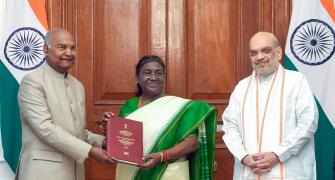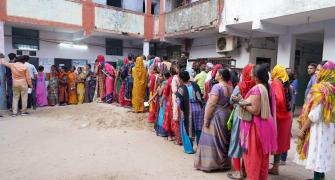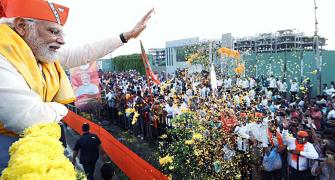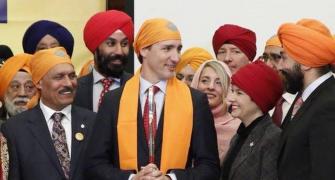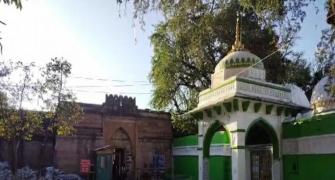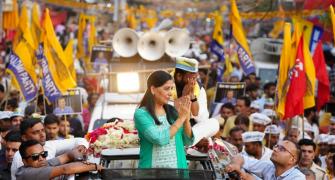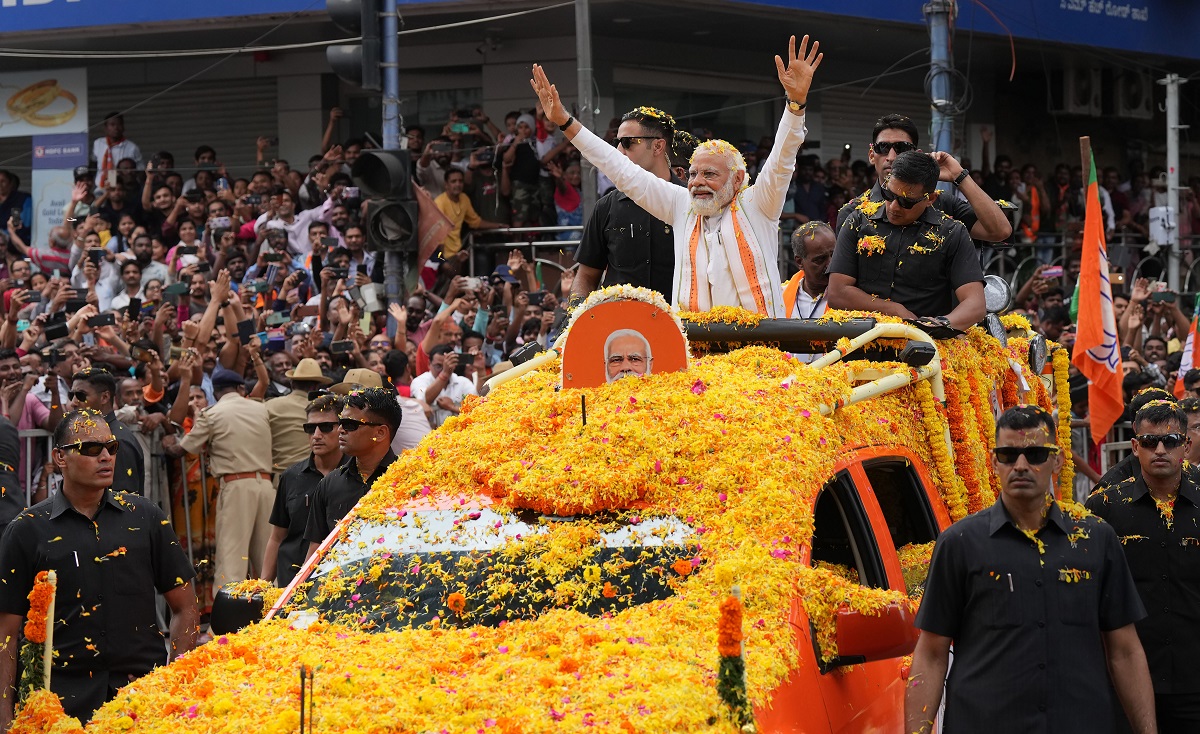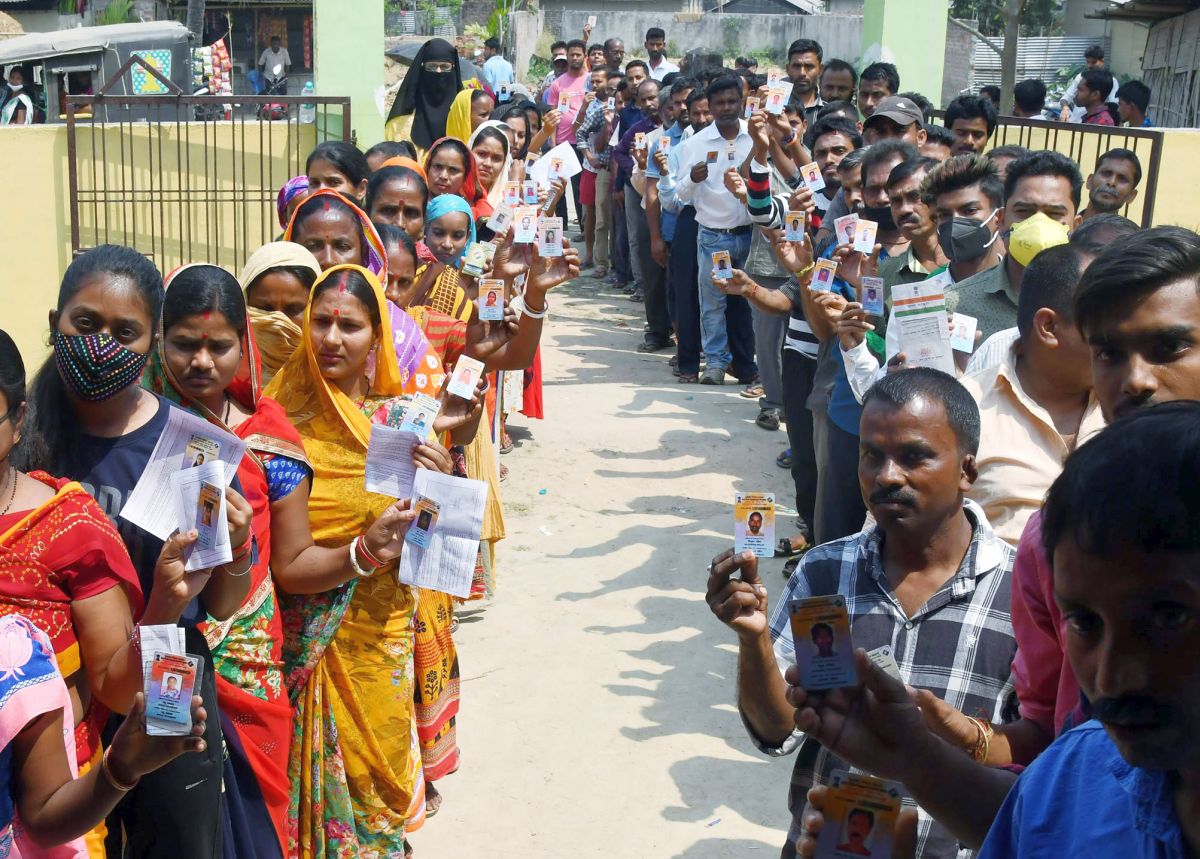'If people are in the queue, they should have sufficient water to drink. There should be a provision for first aid and health workers to help if people faint or suffer from sunstroke... and there should be shade. This is the minimum requirement in terms of preparations'

With the government contemplating the idea of simultaneous Lok Sabha and state elections, India Meteorological Department chief Mrutyunjay Mohapatra said the authorities should certainly take weather conditions and the climate into consideration when planning for such a massive exercise.
Mohapatra told PTI in an interview that India will experience intense heat during the general election period, and the IMD is providing specialised forecasts to help authorities prepare better, but it has not proposed a change in the timings of public rallies and voting.
Asked about the ideal time to hold elections, given the central government's contemplation of the 'one nation, one poll' concept, the IMD director general stressed that the authorities must consider weather conditions and the climate while planning.
'One nation, one poll' refers to the idea of holding simultaneous polls in the country to elect Lok Sabha and state assembly representatives.
The government has proposed this idea, saying it would reduce the deployment of poll officials and security forces multiple times each year and decrease costs incurred by the public exchequer and political parties on their campaigns.
This year, around a billion people are expected to exercise their franchise during the seven-phase general elections between April 9 and June 1, heightening concerns about vulnerability to heat waves.
Gujarat, Madhya Pradesh, Maharashtra, Bihar, Jharkhand, Odisha, and Andhra Pradesh are likely to record a significantly higher number of heatwave days, according to the national weather body.
There's an elevated risk of heatwave-related health issues among the electorate and staff, Mohapatra said.
Given the extreme heat forecast, he said sufficient arrangements for water, cooling, and heat care should be made for public rallies and voting on election days.
"If people are in the queue, they should have sufficient water to drink. There should be a provision for first aid and health workers to help if people faint or suffer from sunstroke... and there should be shade. This is the minimum requirement in terms of preparations," Mohapatra said.
He said the Election Commission of India consulted the IMD before announcing the poll schedule.
"We provided, at the initial stage, the climatological information for March, April, May, and June for different parts of the country so that they can make a judicious decision on which part and at what time they should conduct the elections," he said.
"We are also issuing all types of forecasts and warnings on a daily, weekly, monthly, and seasonal basis," he added.
The IMD has identified areas that are expected to record above-normal temperatures and heatwave conditions.
The weather office is also providing "feel-like temperature" forecasts, which combine the effect of temperature, humidity, and wind speed to give a better idea of how the weather would actually feel outside.
It is also providing forecasts for "warm nights", where night temperatures are on the higher side, making it difficult for people to sleep.
"All these products are being generated and provided to the general public, district administrators, and state-level authorities.
Stakeholders including health, power, labour, agriculture, water resources, and many more at the central level and the state level, as well as the Election Commission and state election commissions, are being provided with this information regularly. This information will certainly help them plan accordingly for the election process," Mohapatra said.
Asked how severe the heat would be during the elections, the IMD chief said above-normal maximum temperatures are likely over most parts of the country in the April-June period, with a high probability over central and western peninsular India.
Four to eight heatwave days are expected in different parts of the country in April against a normal of one to three days. Ten to 20 days of heatwave are expected against a normal of four to eight days in the entire April-June period, he said.
The areas predicted to see more heatwave days are Madhya Pradesh, Gujarat, Odisha, Andhra Pradesh, Madhya Maharashtra, Vidarbha, Marathwada, Bihar, and Jharkhand. Some places may record over 20 days of heatwave.
"Based on our early warning, the National Disaster Management Authority has issued some guidance to the Election Commission based on the forecast of March 1. Now, the April 1 forecast has been communicated, and I hope the Election Commission and NDMA will again discuss and finalise the course of action," Mohapatra said.
The IMD chief said the national weather body has not suggested a change in timings (of public rallies and voting during elections).
"This decision has to be taken by the authorities concerned. But the general guidance from the NDMA and others is that there should be some provision for cooling, water and basic health facilities.
"For example: we have to take into consideration people who will be working as election agents, and election officers in the booths. Therefore, their room should also have the facility to combat the rising temperature," he said.
The death of several people at a Navi Mumbai rally last year due to high heat and humidity prompted the IMD to issue a special warning combining heat and humidity, Mohapatra said.
"If the temperature is at least three degrees Celsius above normal and relative humidity is above normal, we are issuing a warning for that particular district or a particular area," he said, adding that Navi Mumbai did not experience a heatwave at the time of the incident last year but high humidity and long exposure led to the incident.
"So, there are two aspects: One aspect we have addressed this year; we are providing warnings (for hot and humid weather), but you also have to take preparatory measures while you are planning for such a gathering. There should certainly be provisions for water, shade, and cooling," the IMD chief said.
He also said the intense heat could strain power grids, impact the winter-grown crops, and result in water shortages in parts of India.

